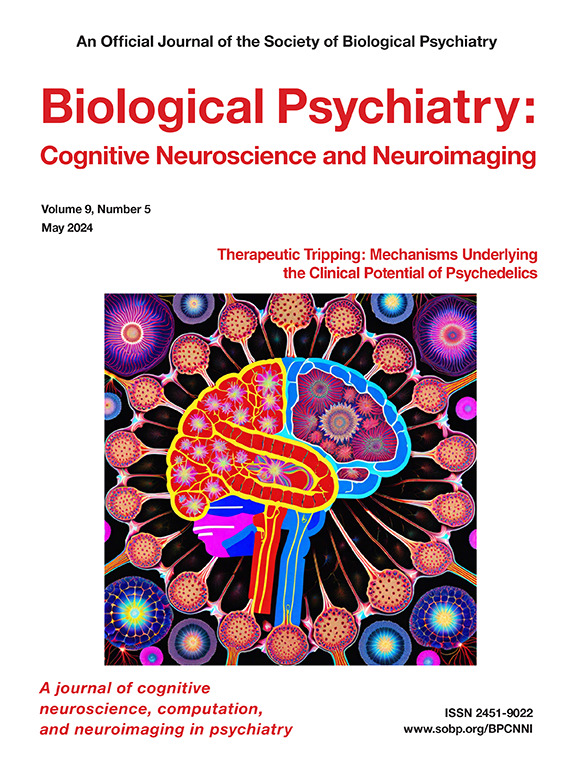Altered Structural Connectivity and Functional Brain Dynamics in Individuals With Heavy Alcohol Use Elucidated via Network Control Theory
IF 5.7
2区 医学
Q1 NEUROSCIENCES
Biological Psychiatry-Cognitive Neuroscience and Neuroimaging
Pub Date : 2024-10-01
DOI:10.1016/j.bpsc.2024.05.006
引用次数: 0
Abstract
Background
Heavy alcohol use and its associated conditions, such as alcohol use disorder, impact millions of individuals worldwide. While our understanding of the neurobiological correlates of alcohol use has evolved substantially, we still lack models that incorporate whole-brain neuroanatomical, functional, and pharmacological information under one framework.
Methods
Here, we utilized diffusion and functional magnetic resonance imaging to investigate alterations to brain dynamics in 130 individuals with a high amount of current alcohol use. We compared these alcohol-using individuals to 308 individuals with minimal use of any substances.
Results
We found that individuals with heavy alcohol use had less dynamic and complex brain activity, and through leveraging network control theory, had increased control energy to complete transitions between activation states. Furthermore, using separately acquired positron emission tomography data, we deployed an in silico evaluation demonstrating that decreased D2 receptor levels, as found previously in individuals with alcohol use disorder, may relate to our observed findings.
Conclusions
This work demonstrates that whole-brain, multimodal imaging information can be combined under a network control framework to identify and evaluate neurobiological correlates and mechanisms of heavy alcohol use.
通过网络控制理论阐明重度酗酒者大脑结构连接和功能动态的改变。
背景:大量饮酒(HAU)及其相关疾病,如酒精使用障碍(AUD),影响着全球数百万人。虽然我们对酒精使用的神经生物学相关性的理解有了很大的发展,但我们仍然缺乏在一个框架下整合全脑神经解剖学、功能学和药理学信息的模型。方法:在这里,我们利用扩散和功能磁共振成像技术研究了N=130名当前大量使用酒精的人的大脑动态变化。我们将这些酗酒者与 N = 308 名极少使用任何药物的人进行了比较:结果:我们发现,HAU 患者的大脑活动的动态性和复杂性较低,而且通过利用网络控制理论,他们完成激活状态之间转换的控制能量有所增加。此外,利用单独获得的正电子发射断层扫描(PET)数据,我们还进行了一项硅学评估,结果表明D2受体水平的降低(如之前在AUD患者中发现的那样)可能与我们观察到的结果有关:这项研究表明,全脑多模态成像信息可以在网络控制框架下进行组合,以识别和评估重度饮酒的神经生物学相关因素和机制。
本文章由计算机程序翻译,如有差异,请以英文原文为准。
求助全文
约1分钟内获得全文
求助全文
来源期刊

Biological Psychiatry-Cognitive Neuroscience and Neuroimaging
Neuroscience-Biological Psychiatry
CiteScore
10.40
自引率
1.70%
发文量
247
审稿时长
30 days
期刊介绍:
Biological Psychiatry: Cognitive Neuroscience and Neuroimaging is an official journal of the Society for Biological Psychiatry, whose purpose is to promote excellence in scientific research and education in fields that investigate the nature, causes, mechanisms, and treatments of disorders of thought, emotion, or behavior. In accord with this mission, this peer-reviewed, rapid-publication, international journal focuses on studies using the tools and constructs of cognitive neuroscience, including the full range of non-invasive neuroimaging and human extra- and intracranial physiological recording methodologies. It publishes both basic and clinical studies, including those that incorporate genetic data, pharmacological challenges, and computational modeling approaches. The journal publishes novel results of original research which represent an important new lead or significant impact on the field. Reviews and commentaries that focus on topics of current research and interest are also encouraged.
 求助内容:
求助内容: 应助结果提醒方式:
应助结果提醒方式:


